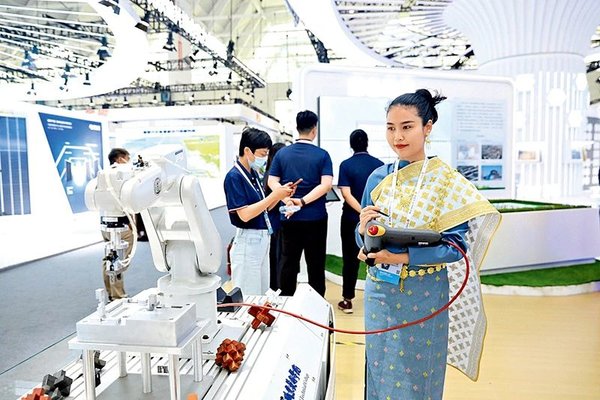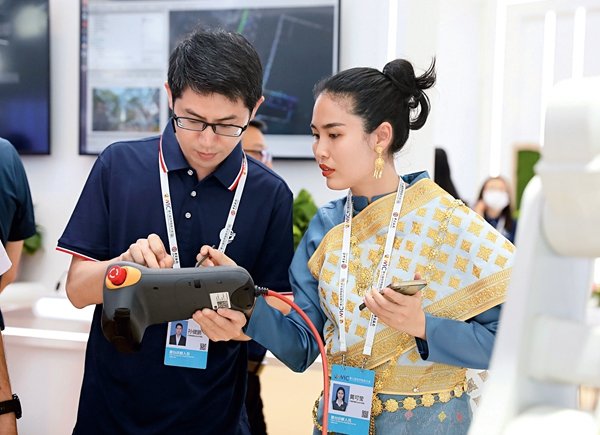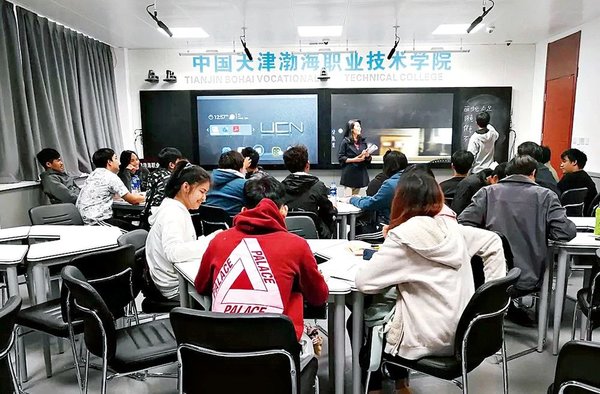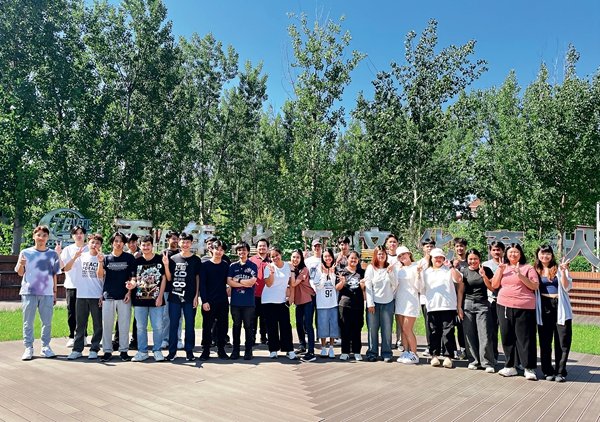My China Story | Thai Teacher Example of 'China-Thailand Kinship'

Nitinun Chomchuen, who uses a Chinese name, Huang Keying, is a Thai teacher working with Tianjin Bohai Vocational Technical College (TBVTC), based in Beichen District of north China's Tianjin Municipality. During a recent interview, she told Women of China: "China impresses me as a very 'big' country, because it has a huge territory, and a large population. Chinese have great moral virtues. They compose a great power once their strength is harnessed, especially during occasions when China is hosting grand events. Besides, China is a country of high efficiency. Chinese tend to do their business quickly, and timely."
Chomchuen comes from Nonthaburi, a city north of Bangkok, capital of Thailand. "I developed my passion for Chinese culture when I was a child, and I was determined to study Chinese at senior school." Chomchuen believes she is "a typical example of China-Thailand kinship."
 |
| Nitinun Chomchuen introduces the Luban Workshop to visitors during the Seventh World Intelligence Congress, in Tianjin. |
 |
| Nitinun Chomchuen and her husband Sun Jianpeng attend the Seventh World Intelligence Congress. |
From Student to Teacher
Chomchuen completed a three-year master's degree at Tianjin University between 2013 and 2016. She received a scholarship from the Chinese Government. Following her graduation, in 2016, she began working at TBVTC — under the Luban Workshop program — as a Chinese-language teacher to Thai students.
In collaboration with Ayutthaya Technical College, in Thailand, TBVTC's Luban Workshop became the first Luban Workshop, launched by China and another country, to provide technological and vocational training. Since 2016, the program has benefitted over 1,000 Thai students, by providing them China-based educational resources, including technology, equipment and scholarships.
To date, China has launched Luban Workshops in 29 countries. Named after Lu Ban, an ancient Chinese woodcraft master, the workshops have become a centerpiece of China's drive to promote international cooperation on vocational education.
 |
| Nitinun Chomchuen with her Thai students, at Tianjin Bohai Vocational Technical College. |
"At the very beginning, I did not know what the Luban Workshop program was about. When I was preparing to graduate, from Tianjin University, I learned TBVTC would work with Ayutthaya Technical College on a long-term, talent-exchange program, entitled 'Luban Workshop.' Through this program, students from Thailand would be provided with scholarships to study in China. I came to China for studies also with a scholarship, so I thought it would be great if I could take part in this program, as a teacher, and if I could help students participate in such an educational-exchange program," Chomchuen says.
In addition to teaching Chinese-language courses to Thai students, Chomchuen has been involved in liaison and interpretation work, thanks to her excellent Chinese skills. To date, more than 100 Thai students have received basic Chinese-language instruction from Chomchuen.
"The Thai students in our program generally study for six semesters. They study the first semester in Thailand, and during semesters 2-5, they study in China. They will spend the last semester on an internship, again in Thailand. During their stay in China, they concentrate on Chinese-language training during the second semester, and then they will spend semesters 3-5 learning techniques at TBVTC," Chomchuen explains.
As the students receive a foundation in both the Chinese language and professional techniques, and as they receive graduation certificates from both a Chinese college and a Thai college, they tend to have better chances of being employed by a Chinese-funded company after they return to Thailand.
"I had a young woman student, whose Chinese name was Ai Meili. She has run her own international-trade business since she completed her studies in Tianjin. Given the language and skills she learned, she has been able to earn a better living for her family in Thailand," Chomchuen adds.
 |
| Nitinun Chomchuen and her students on TBVTC's campus. |
Joint Contributions, Shared Benefits
In Chomchuen's opinion, the "beauty" of the Luban Workshop is that it brings benefits to both Chinese and Thai people. "I think this cooperative project provides a platform, through which not only Thailand can receive support from China, such as teaching resources, teaching tools, scholarships and so on, but Thai students can also bring China-based technologies back to their home," she says.
The Luban Workshop at TBVTC offers four majors: Mechatronics Technology, Mechanical Manufacture and Automation, Internet of Things (IoT) Application Technology, and New Energy Vehicle Technology. "These majors are in demand in Thailand. Students of our project surely have a promising future, and better labor market prospects," Chomchuen says.
Chomchuen and her work are appreciated by her students and colleagues. Since she began working at the college, she met and fell in love with another teacher, Sun Jianpeng, an instructor with the Engineering, Practice and Innovation Project (EPIP), a training model that is part of the Luban Workshop. Sun and Chomchuen married in Tianjin in 2022.
 |
| Nitinun Chomchuen and Sun Jianpeng hold a ceremony in Thailand to celebrate their wedding. |
As Chomchuen has lived in Tianjin for a decade, she has been able to continuously enhance her connection with the city. "The city of Tianjin has become more and more beautiful. Its public transportation has become more convenient. When I first arrived in Tianjin, there were four metro lines. Now, several new metro lines are in service. The city's environment is better protected, through the increased use of wind power. This will help make the environment greener. In both life and work, I feel comfortable here," she says. Tianjin has no doubt become a "home away from home" for Chomchuen.
"I hope China will achieve greater progress in the country's infrastructure development and the building of a better living environment. I also hope people of different cultural backgrounds will live here with mutual respect, and in harmony," Chomchuen says. She is proud when she learns that many graduates of the Luban Workshop have found jobs in the nearly saturated market in Thailand.
Thanyarut Plaisuntea, who graduated from the program in 2017, says: "The Luban Workshop has had a positive influence on me, and the studies and experience were unforgettable."
Photos from Interviewee
(Women of China English Monthly November 2024)
Editor: Wang Shasha
Please understand that womenofchina.cn,a non-profit, information-communication website, cannot reach every writer before using articles and images. For copyright issues, please contact us by emailing: website@womenofchina.cn. The articles published and opinions expressed on this website represent the opinions of writers and are not necessarily shared by womenofchina.cn.








.jpg)

 WeChat
WeChat Weibo
Weibo 京公网安备 11010102004314号
京公网安备 11010102004314号